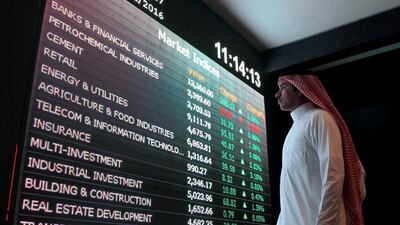Saudi Arabia’s easing of rules for foreign investors’ participation in the stock market starting on Sunday may be a positive step, but it is unlikely to spur an immediate burst of foreign cash owing to slow growth and lingering market limits, analysts said.
Saudi Arabia’s market regulator, the Capital Market Authority, had announced the timeline for new rules last month in a bid to attract international investors, who currently own only 1 per cent of the market. The Saudi equity market, the Arabian Gulf’s largest with a market capitalisation of US$593 billion, allowed foreigners direct access to stocks in June last year. However, it has failed to perform, with the market shedding 12.8 per cent so far this year.
“We may see a marginal rise in foreign investment, but foreign investors will want more clarity on the macro outlook before buying in large volumes,” said Simon Kitchen, the head of macro-strategy at the Egyptian investment bank EFG Hermes.
With the new rules, foreigners with assets under management of at least 3.75bn Saudi riyals (Dh3.67bn) will be able to participate in the stock market, down from 18.75bn riyals previously. The regulator has also doubled the limit for individual foreigners owning shares in a single company to 10 per cent.
“It’s not going to do any good at the moment because everyone is expecting a contraction of the economy related to the recent changes in the fiscal budget,” said Mohammed Al Suwayed, the head of capital and money markets at Adeem Capital in Riyadh.
Saudi Arabia is tightening its purse strings as oil remains more than 50 per cent lower than in 2014.
This year’s fiscal budget includes expected expenditure of 840bn riyals, 14 per cent less than last year.
According to the IMF, the kingdom’s economy is forecast to grow 1.2 per cent this year, down from 3.5 per cent last year as the lower oil income trims growth.
Saudi Arabia revealed in April a 270bn-riyal National Transformation Plan for 2020 that aims to curtail the country's dependence on oil revenue.
The plan includes more than tripling non-oil revenue to 530bn riyals and lowering the public wage bill from 45 per cent of the budget to 40 per cent.
The regulator also plans to change the settlement cycle of listed shares to T+2 from T+0, with expected implementation in the first half of next year. T+2 allows for two-day settlement of stock trades, while T+0 allows for same-day settlement.
The regulator also approved the introduction of securities lending and covered short-selling – selling of borrowed securities in anticipation of a fall in prices – also by June next year.
These changes are expected to help Saudi Arabia’s inclusion in international benchmarks such as the MSCI Emerging Markets Index, a gauge used by investors to channel funds.
dalsaadi@thenational.ae
Follow The National's Business section on Twitter

